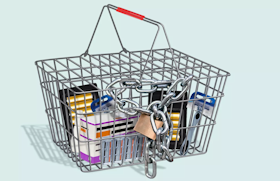|
LA Times: Retail Chains Discriminating With
Security Measures
Noticing lots of security locks at drugstores? These L.A. stores lock up the
most
While shopping for decongestant at Walmart in Burbank, Michelle Krider ran into
a frustrating sign of the times: The nasal spray was on a shelf, locked beyond
plexiglass.
It’s a common problem as
store managers add more and
more security measures.
 Where
once only expensive booze and electronics were locked up, now basic household
items such as allergy medicine, shaving razors, infant formula and batteries are
ending up in plexiglass cases or behind security devices. More merchandise also
has been moved to displays behind cashier counters. Where
once only expensive booze and electronics were locked up, now basic household
items such as allergy medicine, shaving razors, infant formula and batteries are
ending up in plexiglass cases or behind security devices. More merchandise also
has been moved to displays behind cashier counters.
Getting those products requires the help of increasingly scarce retail workers.
Industry experts and retail companies say the
security measures are a
response to rising retail crime.
“More people are stealing and stealing more,” said Read Hayes, a criminologist
at the University of Florida and director of the Loss Prevention Research
Council, an industry research group studying retail theft.
But a Times survey — albeit unscientific — of Los Angeles area drugstores
suggests it’s not a straightforward equation, with stores in higher-income areas
locking up fewer of the types of items that are most often stolen, even where
the property crime rate is higher.
In so doing, critics say,
chains discriminate against
lower-income neighborhoods
where most of the residents are people of color, creating an additional burden
for shoppers there.
&uuid=(email))
The problem has been particularly acute in Los Angeles, which for the last four
years has been identified by the National Retail Federation as the city with the
worst organized retail crime problem, ahead of San Francisco/Oakland, New York
and Houston.
To get a sense of which
stores are adopting the greatest number of security measures, The Times surveyed
Southern California locations for the nation’s four largest pharmacies and
drugstores: CVS Pharmacy, Rite Aid, Walgreens and Walmart. The four companies
combined account for about 70% of the nation’s pharmacy and drug sales,
according to the market research company IBIS World.
The Times visited 15 stores throughout Santa Monica, South Gate, Burbank,
Glendale, Pasadena and Monrovia to compare the security measures in upper-income
and middle- and working-class neighborhoods. We checked to see whether security
measures were put on 15 individual items that were included in a list by the
National Retail Federation of the top targets of organized retail crime. We
added to the list a few that are often locked up in Southern California stores,
such as Tide detergent pods and teeth whitening strips.
Walgreens put security devices
on more of the products we surveyed than the other three retail chains, an
average of ten out of 15 items. Rite Aid had the least number of security
measures, an average of seven out of 15 store items.
Although the number of items with added security measures varied very little
among the Walmart stores we surveyed, we noted that all the outlets had
partitioned off a portion of their pharmacy departments where high-priced health
and beauty products are sold. If shoppers want to buy expensive cosmetics or
shampoos they must enter the partitioned area and pay a cashier before leaving
through a narrow exit back to the rest of the store.
But community activists say
the extra security measures adopted by retailers in some low-income
neighborhoods are frustrating and often not justified by crime rates.
“Latino and African American neighborhoods have been racially profiled to have
extra security measures in the stores that I believe aren’t even warranted,”
said Najee Ali, a social and political activist in South Los Angeles.
The problem has become so severe that Rite Aid executives recently groused that
the “shrink” at Rite Aid stores was $5 million higher than in the previous three
months and had forced the company to consider extreme measures.
The company is in the midst of
closing 145 stores in 17 states as part of a larger cost-cutting move.
“We’re looking at literally putting everything behind showcases to ensure the
products [are] there for customers who want to buy it,” Andre Persaud, the
company’s chief retail officer, said during a conference call with investors and
analysts to discuss earnings. “And then lastly, we’ve even had to go to the
extent of using off-duty police officers in some of our stores.”
In a statement, Rite Aid said, “we are seeing a higher level of brazen
shoplifting and organized retail crime, and we are taking an active role in
helping the police in their pursuit of shoplifters.”
latimes.com
|